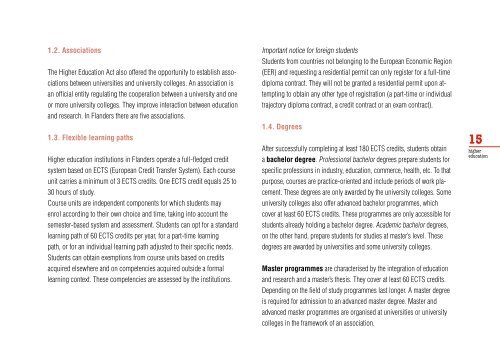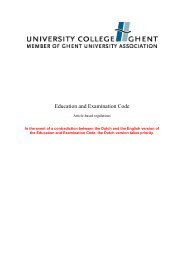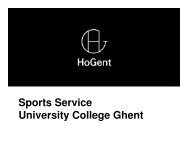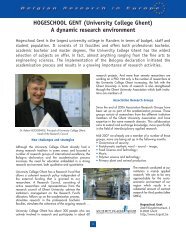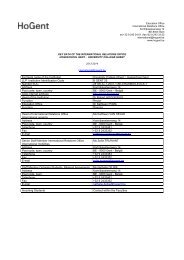Study Abroad? Destination Ghent! - Universiteit Gent
Study Abroad? Destination Ghent! - Universiteit Gent
Study Abroad? Destination Ghent! - Universiteit Gent
You also want an ePaper? Increase the reach of your titles
YUMPU automatically turns print PDFs into web optimized ePapers that Google loves.
1.2. Associations<br />
The Higher Education Act also offered the opportunity to establish associations<br />
between universities and university colleges. An association is<br />
an official entity regulating the cooperation between a university and one<br />
or more university colleges. They improve interaction between education<br />
and research. In Flanders there are five associations.<br />
1.3. Flexible learning paths<br />
Higher education institutions in Flanders operate a full-fledged credit<br />
system based on ECTS (European Credit Transfer System). Each course<br />
unit carries a minimum of 3 ECTS credits. One ECTS credit equals 25 to<br />
30 hours of study.<br />
Course units are independent components for which students may<br />
enrol according to their own choice and time, taking into account the<br />
semester-based system and assessment. Students can opt for a standard<br />
learning path of 60 ECTS credits per year, for a part-time learning<br />
path, or for an individual learning path adjusted to their specific needs.<br />
Students can obtain exemptions from course units based on credits<br />
acquired elsewhere and on competencies acquired outside a formal<br />
learning context. These competencies are assessed by the institutions.<br />
Important notice for foreign students<br />
Students from countries not belonging to the European Economic Region<br />
(EER) and requesting a residential permit can only register for a full-time<br />
diploma contract. They will not be granted a residential permit upon attempting<br />
to obtain any other type of registration (a part-time or individual<br />
trajectory diploma contract, a credit contract or an exam contract).<br />
1.4. Degrees<br />
After successfully completing at least 180 ECTS credits, students obtain<br />
a bachelor degree. Professional bachelor degrees prepare students for<br />
specific professions in industry, education, commerce, health, etc. To that<br />
purpose, courses are practice-oriented and include periods of work placement.<br />
These degrees are only awarded by the university colleges. Some<br />
university colleges also offer advanced bachelor programmes, which<br />
cover at least 60 ECTS credits. These programmes are only accessible for<br />
students already holding a bachelor degree. Academic bachelor degrees,<br />
on the other hand, prepare students for studies at master’s level. These<br />
degrees are awarded by universities and some university colleges.<br />
Master programmes are characterised by the integration of education<br />
and research and a master’s thesis. They cover at least 60 ECTS credits.<br />
Depending on the field of study programmes last longer. A master degree<br />
is required for admission to an advanced master degree. Master and<br />
advanced master programmes are organised at universities or university<br />
colleges in the framework of an association.<br />
15<br />
higher<br />
education


